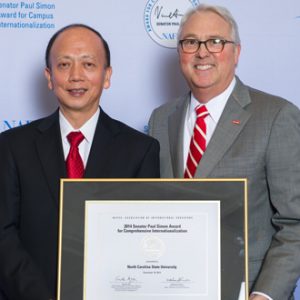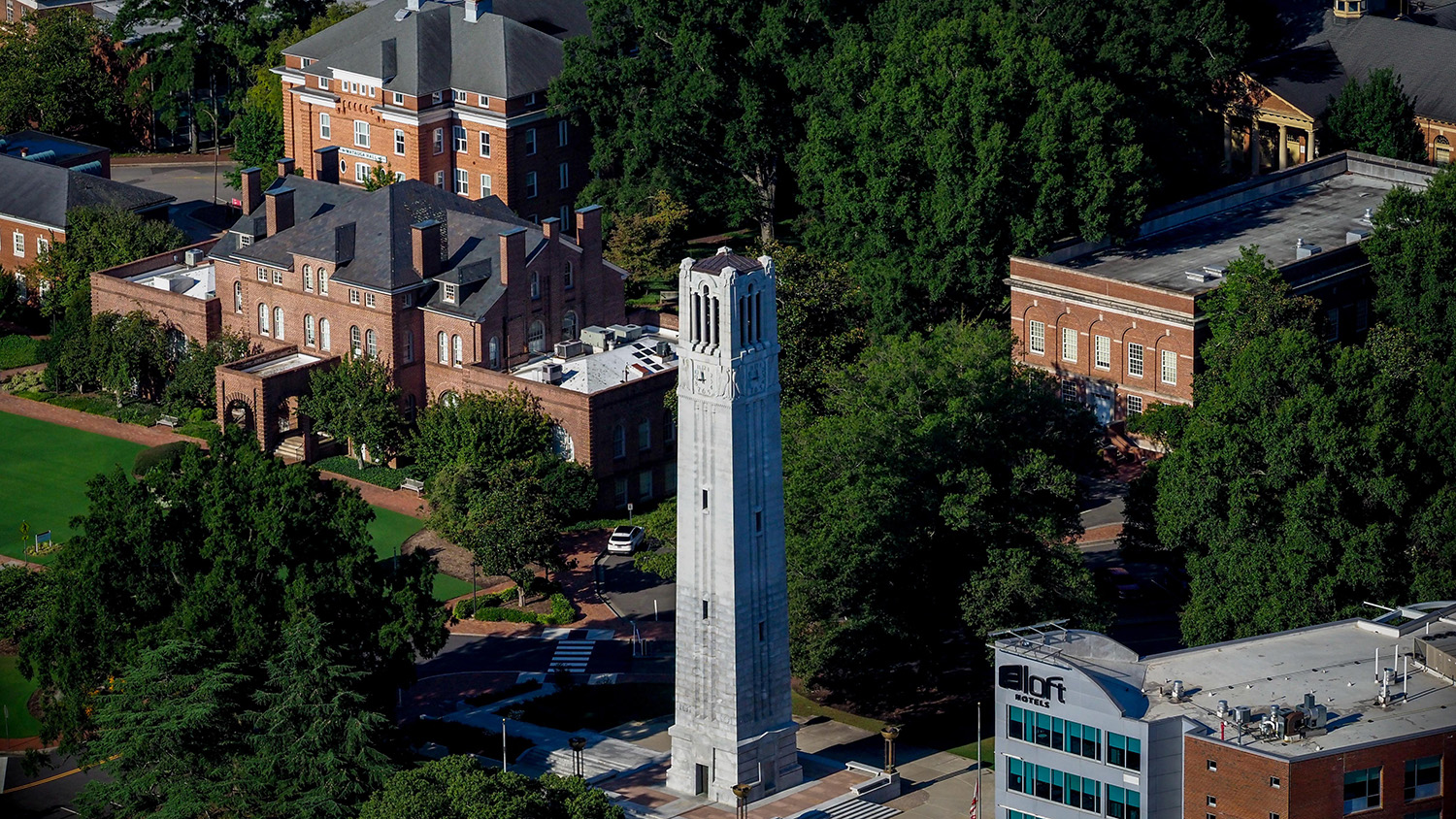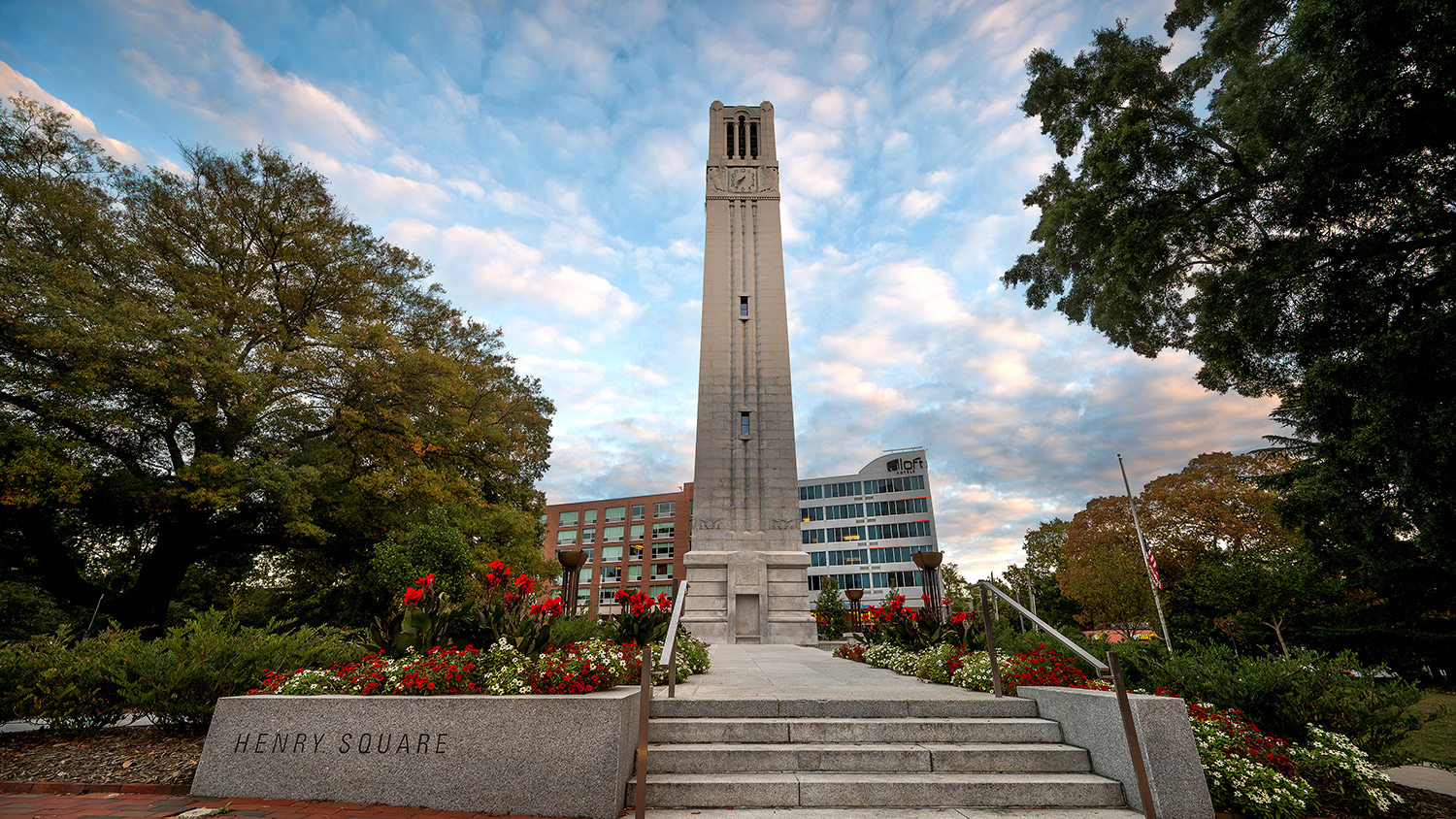Get to Know: International Affairs

The Office of International Affairs (OIA) provides a home for global engagement and collaboration at NC State. Through internal initiatives and external partnerships, the office brings global perspectives to campus while exporting the university’s solution-driven research all over the world.
We spoke with Bailian Li, vice provost for international affairs, about how OIA supports faculty, staff and students by equipping them with the international knowledge, cultural understanding, skills and experience necessary to succeed in today’s global economy.

What is the role of the Office of International Affairs at NC State? Why is global engagement important?
We provide global engagement leadership to fulfill the university’s mission. We consider ourselves the center for global engagement on campus for research, education and economic development.
As a land-grant university, our mission expands beyond North Carolina to the nation and the world. It is a very competitive world and a globally-connected one, so we want to make sure our students are prepared. Students will be working with people from different cultures, so we want to make sure that they have the knowledge, skills and understanding necessary to work with people from different backgrounds in this very global economy.
Also, we’re making students more innovative — you can’t design something just based on your culture that you can sell here — to be globally competitive, students need to have an understanding of different cultures.
Global engagement is also important for faculty, because research is now very interdisciplinary and international in nature. To address global challenges, you have to work at an international level, and our office provides that. We maintain a tradition of working within the community to connect the local with the global. As Chancellor Woodson has said, we want to be locally responsive and globally engaged.
International Affairs is an umbrella organization with nine different units that work with faculty, students and the community. For example, the Office of International Services provides immigration support and cultural programming for international students; Study Abroad gives students the chance to study internationally. The Global Training Initiative provides short-term programs and customized training. We also have the Peace Corps and our Intensive English Program, which prepares students to be academically successful. The Confucius Institute provides non-credit Chinese language courses and cultural programs to the community, and the Japan Center provides Japanese language and culture education in the community, K-12 outreach and more. Our Global Health Initiative develops partnerships that engage NC State community members interested in global health, and Passport Services is an official passport acceptance facility open to students, employees and the public. We are a very comprehensive organization, with many units working together to internationalize NC State for the benefit of students, faculty and the community.
What is the role of global partnerships in supporting OIA’s mission and vision?
For global engagement, international partnerships are very important. Historically, we have had individual faculty do joint research on a personal basis. When the chancellor and provost set forth the university’s strategic plan, global engagement with strategic partners became a very specific goal for the university. We want to develop strong partnerships that go beyond individual faculty connections. We want to be a university resource that creates deeper, broader connections with other universities, such as the University of Nagoya in Japan. Because of our relationship with the university, they have an office in Research Triangle Park to support technology transfer, which facilitates economic development.
We have identified key partners that we want to have a much deeper relationship with as far as student exchange, faculty research and technology transfer. This should involve more than just one faculty member or one college at the university; it should be interdisciplinary to get more faculty involved and to be of higher quality.
Most importantly, we want to put resource support toward these partnerships. With strategic partnerships, we can provide seed funding to promote international relationships. We have a variety of funding programs specifically designed to connect faculty with select global strategic partners for collaborative research purposes. Research is strengthened by building partnerships, and it also eases the study abroad process since it often results in more funding for these types of initiatives.
What does OIA do to support NC State faculty and staff, particularly in the area of research?
We support quite a bit of faculty research on campus, and often faculty need an excellent graduate student or visiting scholar to assist in that research. Our office helps with that. We have over 4,000 international students, more than 70 percent of them are graduate students. And we have more than 700 visiting scholars. We are supporting all of these people by providing immigration advising so they legally can be here. Of the total graduate student population, nearly 30 percent are international students, and they contribute a tremendous amount to faculty research. Without this structure and support, our faculty would not be able to do all that they do now.
We have several faculty and staff awards to recognize their contributions to the university’s global engagement. We have the Outstanding Global Engagement Award, the International Service Award and Recognition for Leadership in International Education. Our office works with faculty very closely on curriculum integration. We have an associate director dedicated to curriculum integration, working with departments to integrate study abroad into their curriculum and to identify the best match for student’s degree programs with study abroad experiences. We also have workshop opportunities for faculty, including training focused on working with international students. Of course, we also host many events, including global seminars where faculty talk about issues such as global energy, security and health, and students can attend, ask questions and learn.
How does OIA support increasing the cultural competency of the campus community?
Cultural competency is one of the most important results of our educational efforts. During Diversity Education Week, we participated in at least five events on campus, including ones run by the Confucius Institute and our Global Training Initiative.
Students are our main focus, and we have a specific goal to enhance student academic success by integrating global perspectives. We want to make sure we do this at home and abroad. We have increased our study abroad to approximately 20 percent of the student population, before graduation. We’re also part of a larger initiative, called Generation Study Abroad, that is working to increase overall and underrepresented student participation in study abroad by 50%. We are working with development to raise $1 million in scholarship funds to send more students abroad, since study abroad is considered a high-impact activity for student success.
However, 80 percent of our students do not study abroad, so we have several initiatives on campus to help them with global learning. We have a Cultural Exchange Network that links international students with domestic students to participate in cultural and academic activities as well as service learning. This is also a great opportunity for domestic students to learn new languages and for international students to practice their English. So far over 3,000 students have participated, including those from the SKEMA Business School.
Our Global Training Initiative facilitates cross-cultural training for faculty, staff, students and businesses. We now have four Berlitz-certified trainers that provide custom workshops and act as a resource for the campus community. We view diversity as much broader than what is in the United States; we are working within a global community.
The Confucius Institute hosts many cultural events, including a recent one at Hunt Library with the Chamber of Commerce, since many people are interested in doing business in China. The Global Training Initiative has been working with our legislature in this area as well, taking leaders to China and Japan. As a land-grant university, it is important that we reach outside our own walls into the community to work on cultural initiatives. Our Japan Center provides orientation for students who want to study abroad in Japan, and the Confucius Institute does the same for students wishing to study in China.
We want to make sure that people are working in a culturally appropriate manner. We want to reach across cultures with our efforts to benefit faculty, staff and students.
What is something that people in the campus community may not know about OIA?
We offer a lot of resources that are underutilized. For example, we distribute a weekly GlobalEyes e-newsletter that is very informational and helpful to the campus community. We encourage the campus community to subscribe on our homepage. We organize a variety of free university-wide global events and want wide participation in those. The newsletter lets people know about these events, as well as research and funding opportunities, global news and more.
To support faculty research, we recently added a new position dedicated to international grants. We want to help faculty grow their international research efforts. We also have a database of faculty with international expertise to help our wider faculty develop focused global partnerships and make connections for collaborative research.
Our units offer a variety of workshops on learning about different cultures and some that help faculty deal with health and safety issues while abroad. Some people may not know we have an Intensive English Program that prepares international undergraduate students to be successful and adjust to teaching and learning styles in the United States. We value academic readiness and success for all our students, and we want them to take advantage of these resources.
We now have a Passport Services office on campus. This reflects efforts to help our students and faculty become globally ready by aiding in travel. It is getting very popular and we have just hired a full-time employee for the office to aid the campus community in passport-related matters.
With all of these resources, we are very entrepreneurial: OIA started with 18 full-time employees 10 years ago, and now we have 48 employees — most of this increase is through self-generated funding. Many may also be unaware that NC State is an award-winning institution in this arena, as a recipient of the Senator Paul Simon Award for Comprehensive Internationalization in 2014; an honor bestowed upon only a few institutions each year. We have had tremendous growth in the past few years and can now serve the university in a much broader way and have a greater impact. We touch all parts of the campus and the community.
Learn more about how OIA serves as NC State’s gateway to the world by overseeing global research, education and partnership efforts that tackle the grand challenges of our interconnected society.
Sign up for GlobalEyes, OIA’s weekly e-newsletter, and follow the office on Facebook and Twitter.
- Categories:


